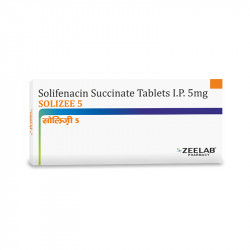Solifenacin
Solifenacin is a medicine used to treat overactive bladder (OAB) and urinary incontinence. It belongs to a class of drugs known as antimuscarinics, which help relax the bladder muscles and prevent frequent urination. This medicine is prescribed to individuals experiencing urgency, leakage, or excessive urination. Regular use of Solifenacin can significantly improve bladder control and quality of life. It is available in tablet form and should be taken as directed by a healthcare professional.
Uses of Solifenacin
- Treats overactive bladder (OAB)
- Reduces urinary urgency and frequency
- Prevents involuntary urine leakage
- Improves bladder control
- Helps manage nocturia (frequent urination at night)
How Solifenacin Works
Solifenacin works by blocking specific receptors in the bladder muscles, reducing muscle contractions and increasing bladder capacity. This helps control urinary urgency and frequency, allowing better control over urination. By relaxing the bladder muscles, it prevents sudden urges and leakage.
Benefits of Solifenacin
- Provides relief from an overactive bladder
- Reduces frequent urination
- Prevents unexpected urine leakage
- Enhances bladder control and comfort
- Improves overall quality of life
How to Take Solifenacin
- Take Solifenacin exactly as prescribed by your doctor.
- Swallow the tablet whole with water, with or without food.
- Take it once daily at the same time for best results.
- Do not crush or chew the tablet.
- Follow your doctor’s advice regarding dosage adjustments.
Types of Dosage Available
- Solifenacin 5mg Tablets
- Solifenacin 10mg Tablets
Side Effects of Solifenacin
- Common side effects: Dry mouth, constipation, blurred vision
- Less common: Dizziness, fatigue, nausea
- Severe side effects: Difficulty urinating, irregular heartbeat, severe allergic reactions
- Consult a doctor if side effects persist or worsen
Safety Advice
- Avoid alcohol consumption while taking Solifenacin.
- Not suitable for individuals with severe liver or kidney disease.
- Pregnant or breastfeeding women should consult a doctor before use.
- Do not drive or operate heavy machinery if you experience dizziness.
- Stay hydrated to reduce the risk of constipation.
Frequently Asked Questions
Q: How long does it take for Solifenacin to work?
A: Solifenacin starts working within a few days, but full effects may take up to 4 weeks.
Q: Can I stop taking Solifenacin once my symptoms improve?
A: No, continue taking it as prescribed. Stopping suddenly may cause symptoms to return.
Q: Is Solifenacin safe for elderly patients?
A: Yes, but dosage adjustments may be needed for elderly individuals with kidney or liver issues.
Q: Can I take Solifenacin with other medications?
A: Inform your doctor about all medicines you are taking, as some may interact with Solifenacin.
Q: What should I do if I miss a dose of Solifenacin?
A: Take the missed dose as soon as you remember. If it’s almost time for your next dose, skip the missed one.
Download India's most affordable pharmacy app
- Compare with medicine prices
- Save upto 90% on your medicine bills

Temperature Controlled storage and delivery

Regular Sanitization

Disinfected Packaging















 Added!
Added!